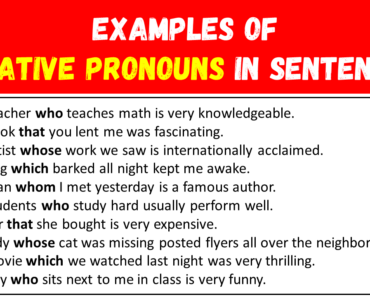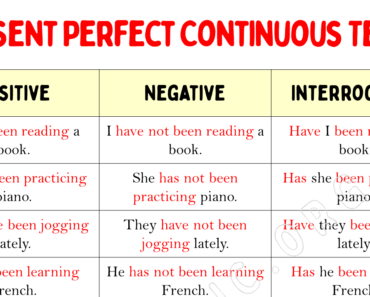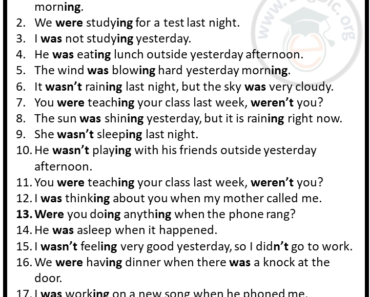50 Examples of Irregular Verbs in Sentences! English is a complex language with many rules and exceptions. One of the most difficult topics for native and non-native speakers alike is irregular verbs, which are verbs that do not follow the standard patterns of conjugation. Irregular verb usage can be confusing, but it is important to understand the basics to become a proficient English speaker. This article provides 50 examples of irregular verbs in sentences so readers can gain an understanding of how they are used in context.

50 Examples of Irregular Verbs
| Present | Past | Past Participle | |
| 1. | Buy | Bought | Bought |
| 2. | Wring | Wrung | Wrung |
| 3. | Sling | Slung | Slung |
| 4. | Learn | Learned | Learned |
| 5. | Be | Was | Been |
| 6. | Fall | Fell | Fallen |
| 7. | Spring | Sprang | Sprung |
| 8. | Freeze | Froze | Frozen |
| 9. | Deal | Dealt | Dealt |
| 10. | Spend | Spent | Spent |
| 11. | Withstand | Withstood | Withstood |
| 12. | Tell | Told | Told |
| 13. | Broadcast | Broadcast | Broadcast |
| 14. | Give | Gave | Given |
| 15. | Forsake | Forsook | Forsaken |
| 16. | Cling | Clung | Clung |
| 17. | Burst | Burst | Burst |
| 18. | Spell | Spelt | Spelt |
| 19. | Burn | Burned | Burned |
| 20. | Grind | Ground | Ground |
| 21. | Keep | Kept | Kept |
| 22. | Leap | Leapt | Leapt |
| 23. | Awake | Awoke | Awoken |
| 24. | Catch | Caught | Caught |
| 25. | Read | Read | Read |
| 26. | Sing | Sang | Sung |
| 27. | Sell | Sold | Sold |
| 28. | Overthrow | Overthrew | Overthrown |
| 29. | Bet | Bet | Bet |
| 30. | Think | Thought | Thought |
| 31. | Overtake | Overtook | Overtaken |
| 32. | Slide | Slid | Slid |
| 33. | Blow | Blew | Blown |
| 34. | Kneel | Knelt | Knelt |
| 35. | Bear | Bore | Borne |
| 36. | Go | Went | Gone |
| 37. | Eat | Ate | Eaten |
| 38. | Cost | Cost | Cost |
| 39. | Choose | Chose | Chosen |
| 40. | Win | Won | Won |
| 41. | Saw | Sawed | Sawn |
| 42. | Weep | Wept | Wept |
| 43. | Bite | Bit | Bitten |
| 44. | Thrust | Thrust | Thrust |
| 45. | Cast | Cast | Cast |
| 46. | Ride | Rode | Ridden |
| 47. | Withhold | Withheld | Withheld |
| 48. | Uphold | Upheld | Upheld |
| 49. | Teach | Taught | Taught |
| 50. | Beset | Beset | Beset |
Related: 100 Examples of Irregular Verbs
50 Examples of Irregular Verbs in Sentences
Buy – bought – bought:
- Present: I usually buy groceries on Sundays.
- Past: Last week, I bought a new car.
- Past Participle: I have bought all the necessary ingredients for tonight’s dinner.
Wring – wrung – wrung:
- Present: She wrings out her wet hair after a shower.
- Past: He wrung his hands nervously while waiting for the results.
- Past Participle: The wet clothes were wrung out before hanging them to dry.
Sling – slung – slung:
- Present: He slings his backpack over his shoulder and heads to school.
- Past: She slung her coat on the back of the chair and sat down.
- Past Participle: The hammock was slung between two trees for a lazy afternoon nap.
Learn – learned – learned:
- Present: She learns new skills quickly.
- Past: He learned how to play the piano when he was a child.
- Past Participle: I have learned a lot from my mistakes.
Be – was – been:
- Present: I am happy to be here.
- Past: He was a great athlete in college.
- Past Participle: She has been to many countries around the world.
Fall – fell – fallen:
- Present: The leaves fall off the trees in the autumn.
- Past: She fell down the stairs and hurt her ankle.
- Past Participle: The snow had fallen overnight, covering the ground in white.
Spring – sprang – sprung:
- Present: The cat springs from the window sill to the couch.
- Past: He sprang up from his seat when he heard the news.
- Past Participle: The trap had sprung, and the mouse was caught.
Freeze – froze – frozen:
- Present: The lake freezes in the winter.
- Past: She froze in fear when she saw the spider.
- Past Participle: The ice cream had frozen solid in the freezer.
Deal – dealt – dealt:
- Present: She knows how to deal with difficult customers.
- Past: He dealt with a lot of stress at work last week.
- Past Participle: The cards were dealt face down on the table.
Spend – spent – spent:
- Present: They spend a lot of money on their vacations.
- Past: She spent hours studying for the exam.
- Past Participle: He has spent all his savings on a new car.
Withstand – withstood – withstood:
- Present: The building is designed to withstand earthquakes.
- Past: She withstood the pain of the injury.
- Past Participle: The statue had withstood the test of time.
Tell – told – told:
- Present: He tells the best jokes.
- Past: She told me a secret last night.
- Past Participle: The story was told by the grandfather to his grandchildren.
Broadcast – broadcast – broadcast:
- Present: The radio station broadcasts news every hour.
- Past: They broadcasted the game live on TV.
- Past Participle: The news had been broadcasted all over the world.
Give – gave – given:
- Present: She gives generously to charity.
- Past: He gave me a birthday present last week.
- Past Participle: The instructions were given in great detail.
Forsake – forsook – forsaken:
- Present: He promised never to forsake his family.
- Past: She forsook her dreams to take care of her parents.
- Past Participle: The old house had been forsaken for years.
Cling – clung – clung:
- Present: The baby clings to her mother’s chest.
- Past: He clung to the rope tightly while climbing the mountain.
- Past Participle: The wet clothes had clung to her skin.
Burst – burst – burst:
- Present: The balloon bursts when it touches a sharp object.
- Past: She burst into tears when she heard the news.
- Past Participle: The pipe had burst, causing a flood in the basement.
Spell – spelt – spelt:
- Present: She can spell difficult words without any mistakes.
- Past: He spelt his name wrong on the application form.
- Past Participle: The word had been spelt incorrectly in the article.
Burn – burned – burned:
- Present: The fire burns brightly in the fireplace.
- Past: She burned her hand while cooking dinner.
- Past Participle: The toast had been burned and was no longer edible.
Grind – ground – ground:
- Present: He grinds coffee beans every morning.
- Past: She ground the spices by hand for the recipe.
- Past Participle: The coffee had been ground to a fine powder.
Keep – kept – kept:
- Present: She keeps her house clean and tidy.
- Past: He kept his promise to finish the project on time.
- Past Participle: The memories had been kept alive through old photographs.
Leap – leapt – leapt:
- Present: The frog leaps from one lily pad to another.
- Past: She leapt over the fence to catch the ball.
- Past Participle: The athlete had leapt over the hurdle with ease.
Awake – awoke – awoken:
- Present: I awake early in the morning.
- Past: She awoke to the sound of birds chirping outside her window.
- Past Participle: The baby had awoken from her nap.
Catch – caught – caught:
- Present: He catches the ball with ease.
- Past: She caught the bus just in time to get to work.
- Past Participle: The thief had been caught by the police.
Read – read – read:
- Present: She reads a new book every week.
- Past: He read the newspaper every morning with his breakfast.
- Past Participle: The novel had been read by millions of people around the world.
Sing – sang – sung:
- Present: She sings in the church choir every Sunday.
- Past: He sang a song for his wife on their anniversary.
- Past Participle: The national anthem had been sung by the entire audience.
Sell – sold – sold:
- Present: They sell fresh vegetables at the farmer’s market.
- Past: She sold her old car and bought a new one.
- Past Participle: The house had been sold to a new owner.
Overthrow – overthrew – overthrown:
- Present: The rebels plan to overthrow the government.
- Past: They overthrew the dictator in a violent revolution.
- Past Participle: The regime had been overthrown, and a new government was established.
Bet – bet – bet:
- Present: He bets on sports games every weekend.
- Past: She bet all her savings on a risky investment.
- Past Participle: The racehorse had been bet on by many people.
Think – thought – thought:
- Present: She thinks deeply about important issues.
- Past: He thought about his decision for a long time before making a choice.
- Past Participle: The idea had been thought of before, but no one had pursued it.
Overtake – overtook – overtaken:
- Present: The car overtakes the slow-moving truck on the highway.
- Past: She overtook the other runners and won the race.
- Past Participle: The company had been overtaken by a competitor in the market.
Slide – slid – slid:
- Present: The children slide down the hill on their sleds.
- Past: She slid on the ice and fell.
- Past Participle: The door had slid open, revealing a dark room.
Blow – blew – blown:
- Present: The wind blows the leaves around in the yard.
- Past: She blew out the candles on her birthday cake.
- Past Participle: The glass had been blown off the table by a strong gust of wind.
Kneel – knelt – knelt:
- Present: They kneel in prayer at the church.
- Past: She knelt down to tie her shoelaces.
- Past Participle: The soldier knelt in front of the flag during the ceremony.
Bear – bore – borne:
- Present: The mother bear protects her cubs from danger.
- Past: He bore the weight of his responsibilities with grace.
- Past Participle: The burden had been borne by the entire community.
Go – went – gone:
- Present: They go on a family vacation every summer.
- Past: She went to the store to buy some groceries.
- Past Participle: The opportunity had gone by before they could act on it.
Eat – ate – eaten:
- Present: They eat a healthy breakfast every morning.
- Past: She ate a delicious meal at the new restaurant in town.
- Past Participle: The food had been eaten by the time they arrived.
Cost – cost – cost:
- Present: The new computer costs a lot of money.
- Past: He cost his team the game by making a crucial mistake.
- Past Participle: The damage had cost them a fortune to repair.
Choose – chose – chosen:
- Present: They choose a different restaurant every weekend.
- Past: She chose a blue dress for the party.
- Past Participle: The winner had been chosen by a panel of judges.
Win – won – won:
- Present: They hope to win the lottery one day.
- Past: He won first prize at the science fair.
- Past Participle: The championship had been won by the underdog team.
Saw – sawed – sawn:
- Present: He saws the wood into small pieces for the fire.
- Past: She sawed through the rope to free herself from the captivity.
- Past Participle: The log had been sawn into planks for the construction.
Weep – wept – wept:
- Present: She weeps when she watches sad movies.
- Past: He wept at the funeral of his best friend.
- Past Participle: The widow had wept for days after her husband’s death.
Bite – bit – bitten:
- Present: The dog bites his toys when he gets excited.
- Past: She bit her lip to keep from crying.
- Past Participle: The apple had been bitten into pieces by the hungry child.
Thrust – thrust – thrust:
- Present: He thrusts his sword into the air after winning the battle.
- Past: She thrust the book into her bag and rushed to catch the bus.
- Past Participle: The door had been thrust open by the strong wind.
Cast – cast – cast:
- Present: She casts a spell to protect her home from evil spirits.
- Past: He cast his vote in the election.
- Past Participle: The role had been cast for the new movie.
Ride – rode – ridden:
- Present: They ride their bicycles to work every day.
- Past: She rode a horse for the first time on her vacation.
- Past Participle: The horse had been ridden for hours by the experienced rider.
Withhold – withheld – withheld:
- Present: He withholds his opinion until he hears all the facts.
- Past: She withheld the information from her boss to avoid getting in trouble.
- Past Participle: The payment had been withheld until the work was completed.
Uphold – upheld – upheld:
- Present: The judge upholds the law in the court of justice.
- Past: She upheld the tradition of her family by celebrating their cultural holidays.
- Past Participle: The rule had been upheld by the school board.
Teach – taught – taught:
- Present: She teaches English to non-native speakers.
- Past: He taught history at the university for many years.
- Past Participle: The students had been taught by some of the best professors in the country.
Beset – beset – beset:
- Present: The town is beset by problems with its infrastructure.
- Past: She was beset by doubts about her ability to succeed.
- Past Participle: The castle had been beset by invaders from all sides.






